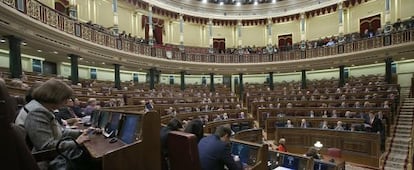More than just politicians
Almost 70 percent of members of Spain’s Congress have another job


The recent revelation that two senior members of the Popular Party, Vicente Martínez-Pujalte and Federico Trillo, were employed by one of Spain’s leading construction companies while they were members of Congress, has highlighted a long-standing problem over conflicts of interest. Deputies are supposed to declare their private and public activities to Congress, although there are no mechanisms to sanction rule-breakers. In all, 238 of the 350 members of Congress have second jobs, whether in the public or private sector, and 169 have secondary sources of income.
Pujalte, who is still a member of Congress, and Trillo, Spain’s ambassador to the United Kingdom, worked as consultants. At least 37 other deputies have been given permission to work as lawyers and consultants.
The law allows elected officials to have two or more jobs, but they can only be paid out of the public purse for one
Trillo and Pujalte were hired by Grupo Collosa, a construction company that was awarded the contract to build a series of wind farms in Castilla y León. Trillo was paid €354,560 over three years, while Pujalte received €75,000 in a year. The Tax Agency – which has raised the matter with the Anticorruption Attorney’s Office, alleging that there was a network that provided information about the wind farms – says it has not uncovered any documents that justify the payments to both men.
Around 80 parliamentarians are columnists or appear regularly on television debates, and as such will be paid, if only to cover their expenses. Few bother to provide any information when submitting their tax returns. The law allows elected officials to have two or more jobs, but they can only be paid out of the public purse for one.
Government sidelines
- Popular Party. Spain's ruling group has 185 deputies, of which 141 have other jobs, 98 of them paid. There are 36 who work in the media, 27 lawyers, two doctors, a pharmacist, an engineer, and an economist. Around 30 work for private companies. There are 36 councilors, 24 mayors and 43 civil servants on leave.
- Socialist Party. Fifty-eight of the 110 deputies have other jobs, and 44 have declared other earnings. There are 32 teachers, 13 of them on sabbatical leave, along with 26 with media jobs, 10 councilors, seven lawyers and a mayor. The remaining 26 are civil servants on leave.
- Mixed Grouping. Thirteen of the 18 deputies that make up this group of minority parties have second jobs. There are seven with media jobs, four teachers, four councilors, two with business interests, and a lawyer. There are also four civil servants on leave.
- CiU. The 16 members of the Catalan pro-independence party all have other jobs, working in the media or as teachers.
- Plural Left. One of its 11 deputies appears on debate programs, and three are teachers.
- UPyD. Two of the five deputies of this center-right minority party have media jobs, and three are teachers.
- Basque Group. One of the five legislators of the pro-independence grouping works in the media, and two are teachers.
Thirty-eight deputies, 30 of them from the PP, five from the Socialist Party, and three from the smaller parties, work for, are board members of, or manage or own private companies. José María Beneyto (PP) is authorized to run a legal and economic consultancy. In 2011, the most recent year for which records are available, he declared earnings of more than €500,000. Jesús Caicedo is the PP Mayor of Cuevas de Almanzora, in Almería, and the managing director of three limited companies. José Ignacio Landaluce, also a member of the PP, is mayor of Algeciras, in Cádiz province, and also runs a number of private clinics.
The only deputy who has not formally been granted compatibility is Iñaki Antigüedad of the pro- Basque independence Amaiur party, who is a lecturer at the University of the Basque Country. However, legislators are allowed to teach and write, and to carry out out any activities related to their political activity, such as running a party or speaking at conferences.
The statement of assets and earnings that Prime Minister Mariano Rajoy presented to Congress in 2011 includes around €100,000 in expenses. Pedro Sánchez, who was elected secretary general of the Socialist Party in 2014, says his post is unpaid, but provides no information on expenses.
Deputies’ companies are not allowed to bid for public tenders or receive subsidies. They are also required to make a statement that they have no relationship with any level of government, although this is not actually checked.
But Carmen Álvarez-Arenas, the PP’s employment spokeswoman in Congress, recently had to declare that a family company on whose board she sits had recently received government subsidies.
Parallel activities are not limited to the private sphere. More than 100 deputies also occupy another public office. The majority are local councilors or mayors. The law allows politicians to hold both posts. Although they cannot be paid, they receives expenses and other financial compensation.
Tu suscripción se está usando en otro dispositivo
¿Quieres añadir otro usuario a tu suscripción?
Si continúas leyendo en este dispositivo, no se podrá leer en el otro.
FlechaTu suscripción se está usando en otro dispositivo y solo puedes acceder a EL PAÍS desde un dispositivo a la vez.
Si quieres compartir tu cuenta, cambia tu suscripción a la modalidad Premium, así podrás añadir otro usuario. Cada uno accederá con su propia cuenta de email, lo que os permitirá personalizar vuestra experiencia en EL PAÍS.
¿Tienes una suscripción de empresa? Accede aquí para contratar más cuentas.
En el caso de no saber quién está usando tu cuenta, te recomendamos cambiar tu contraseña aquí.
Si decides continuar compartiendo tu cuenta, este mensaje se mostrará en tu dispositivo y en el de la otra persona que está usando tu cuenta de forma indefinida, afectando a tu experiencia de lectura. Puedes consultar aquí los términos y condiciones de la suscripción digital.








































